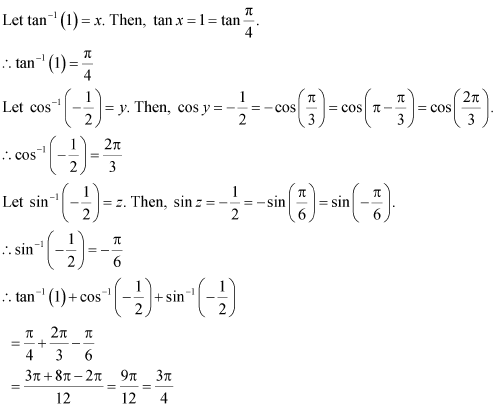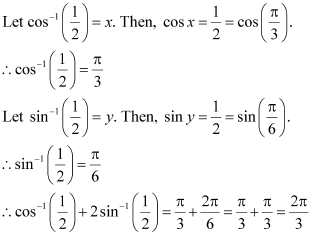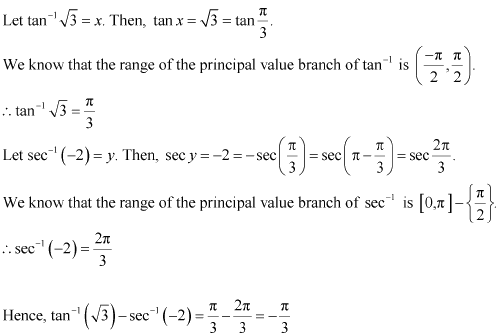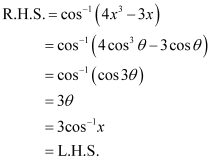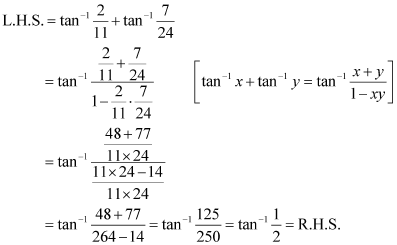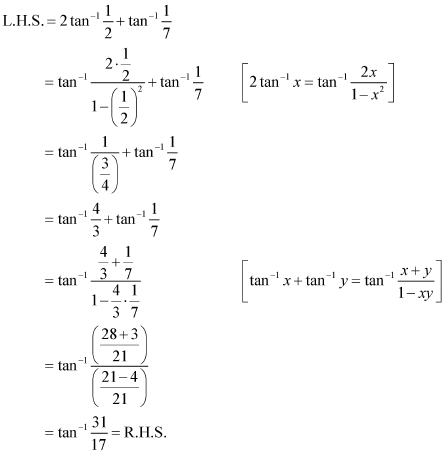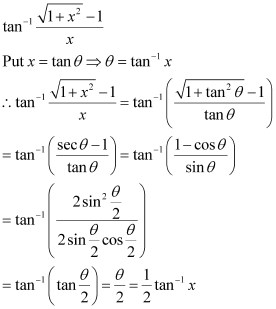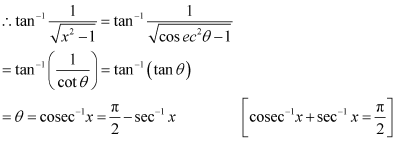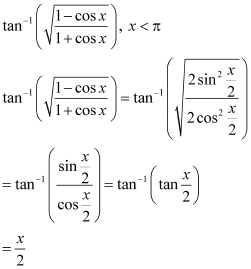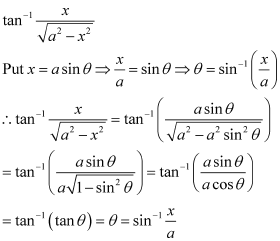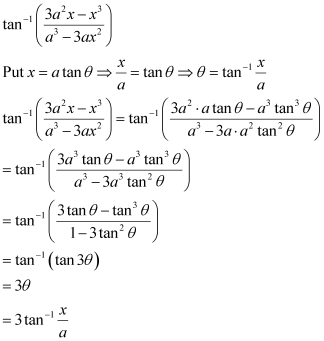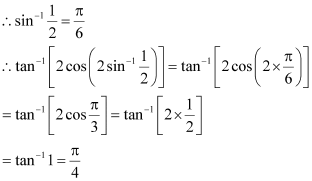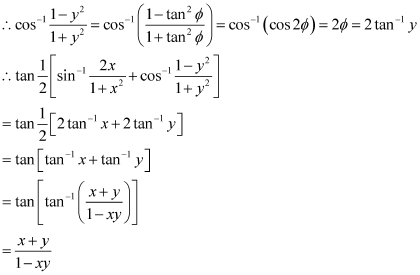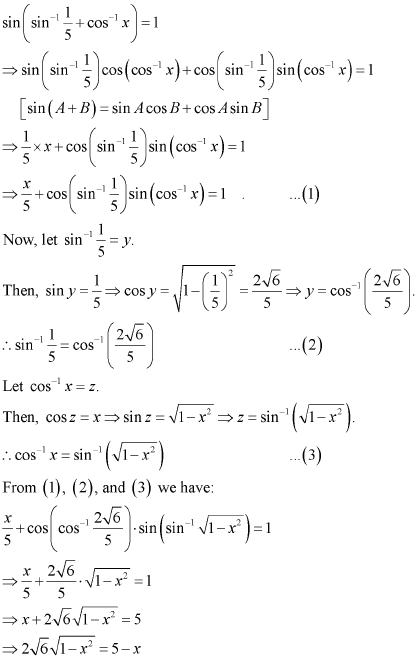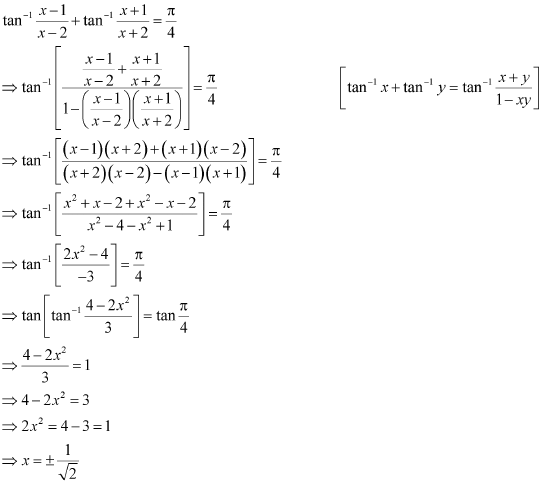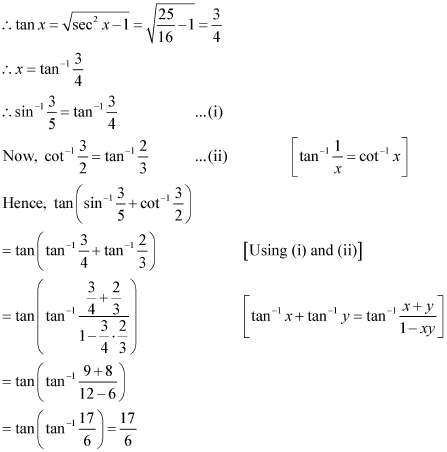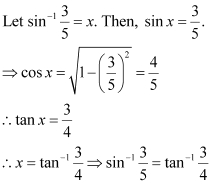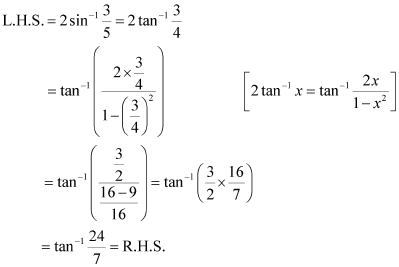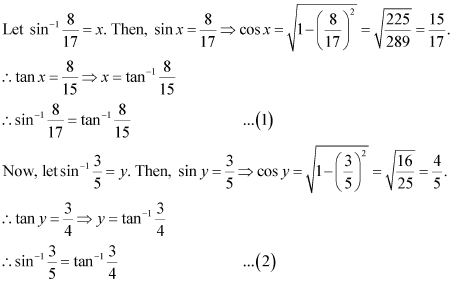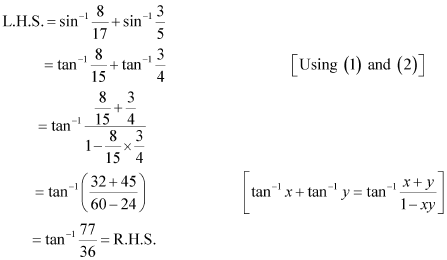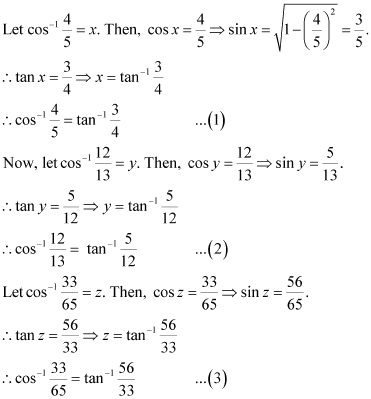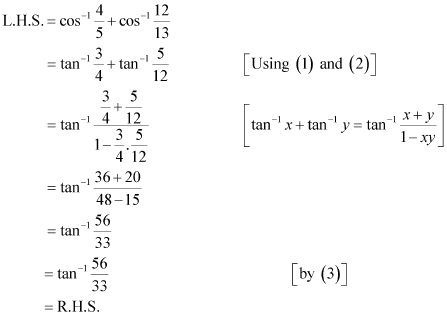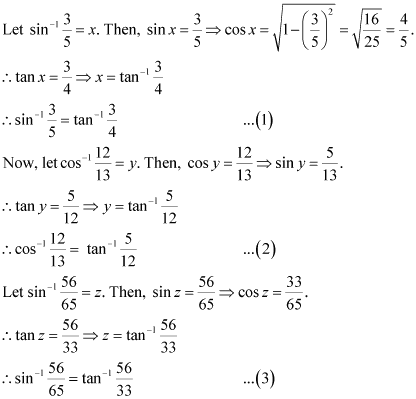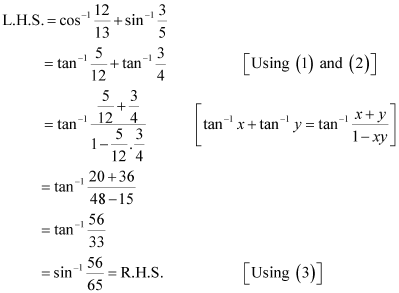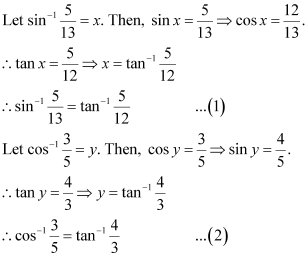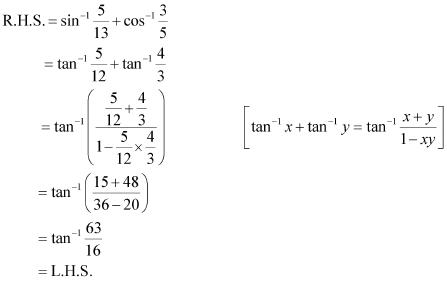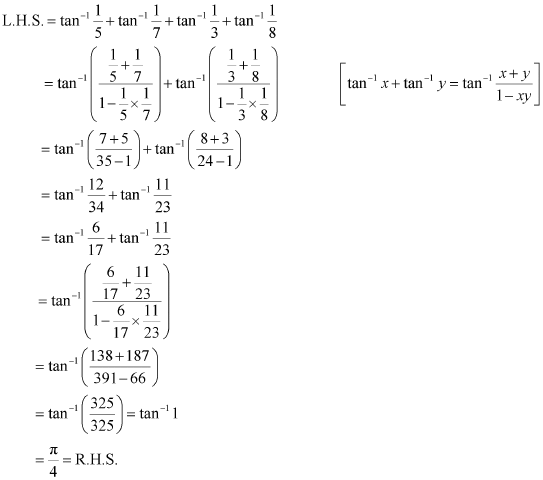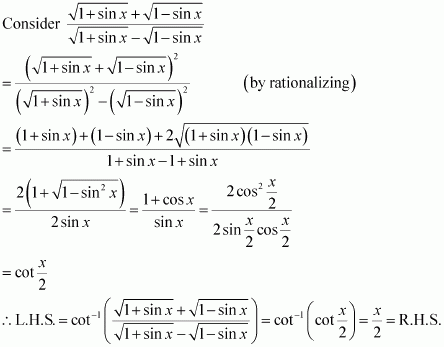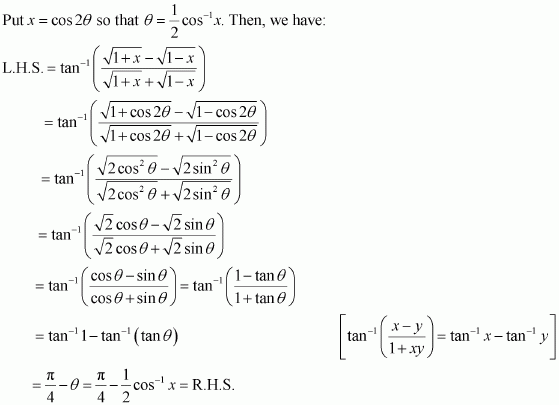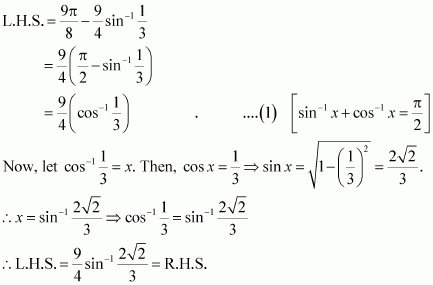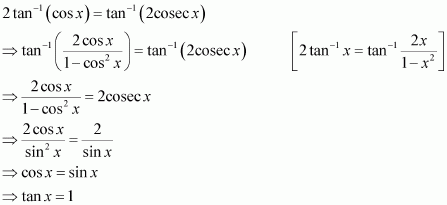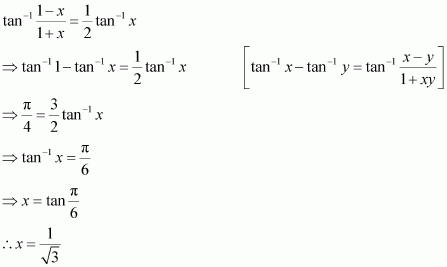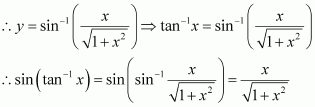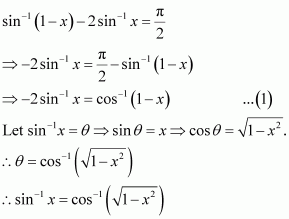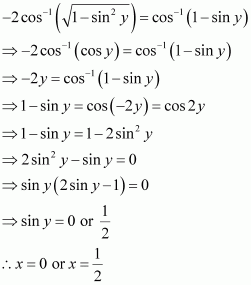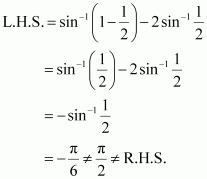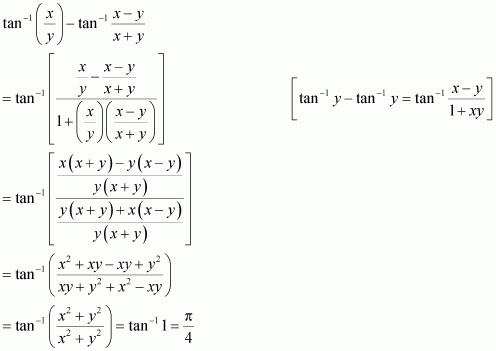Page No 41:
Question 1:
Find the principal value of
Answer:
Let sin-1 Then sin y =
We know that the range of the principal value branch of sin−1 is
and sin
Therefore, the principal value of
Question 2:
Find the principal value of
Answer:
We know that the range of the principal value branch of cos−1 is
.
Therefore, the principal value of
Question 3:
Find the principal value of cosec−1 (2)
Answer:
Let cosec−1 (2) = y. Then,
We know that the range of the principal value branch of cosec−1 is
Therefore, the principal value of
Question 4:
Find the principal value of
Answer:
We know that the range of the principal value branch of tan−1 is
Therefore, the principal value of
Question 5:
Find the principal value of
Answer:
We know that the range of the principal value branch of cos−1 is
Therefore, the principal value of
Question 6:
Find the principal value of tan−1 (−1)
Answer:
Let tan−1 (−1) = y. Then,
We know that the range of the principal value branch of tan−1 is
Therefore, the principal value of
Page No 42:
Question 7:
Find the principal value of
Answer:
We know that the range of the principal value branch of sec−1 is
Therefore, the principal value of
Question 8:
Find the principal value of
Answer:
We know that the range of the principal value branch of cot−1 is (0,π) and
Therefore, the principal value of
Question 9:
Find the principal value of
Answer:
We know that the range of the principal value branch of cos−1 is [0,π] and
.
Therefore, the principal value of
Question 10:
Find the principal value of
Answer:
We know that the range of the principal value branch of cosec−1 is
Therefore, the principal value of
Question 11:
Find the value of
Answer:
Question 12:
Find the value of
Answer:
Question 13:
Find the value of if sin−1 x = y, then
(A) (B)
(C) (D)
Answer:
It is given that sin−1 x = y.
We know that the range of the principal value branch of sin−1 is
Therefore,.
Question 14:
Find the value of is equal to
(A) π (B) (C)
(D)
Answer:
Page No 47:
Question 1:
Prove
Answer:
To prove:
Let x = sinθ. Then,
We have,
R.H.S. =
= 3θ
= L.H.S.
Question 2:
Prove
Answer:
To prove:
Let x = cosθ. Then, cos−1 x =θ.
We have,
Question 3:
Prove
Answer:
To prove:
Question 4:
Prove
Answer:
To prove:
Question 5:
Write the function in the simplest form:
Answer:
Question 6:
Write the function in the simplest form:
Answer:
Put x = cosec θ ⇒ θ = cosec−1 x
Question 7:
Write the function in the simplest form:
Answer:
Question 8:
Write the function in the simplest form:
Answer:
tan-1cosx-sinxcosx+sinx=tan-11-sinxcosx1+sinxcosx=tan-11-tanx1+tanx=tan-11-tan-1tanx tan-1x-y1+xy=tan-1x-tan-1y=π4-x
Page No 48:
Question 9:
Write the function in the simplest form:
Answer:
Question 10:
Write the function in the simplest form:
Answer:
Question 11:
Find the value of
Answer:
Let. Then,
Question 12:
Find the value of
Answer:
Question 13:
Find the value of
Answer:
Let x = tan θ. Then, θ = tan−1 x.
Let y = tan Φ. Then, Φ = tan−1 y.
Question 14:
If, then find the value of x.
Answer:
On squaring both sides, we get:
Hence, the value of x is
Question 15:
If, then find the value of x.
Answer:
Hence, the value of x is
Question 16:
Find the values of
Answer:
We know that sin−1 (sin x) = x if, which is the principal value branch of sin−1x.
Here,
Now, can be written as:
Question 17:
Find the values of
Answer:
We know that tan−1 (tan x) = x if, which is the principal value branch of tan−1x.
Here,
Now, can be written as:
Question 18:
Find the values of
Answer:
Let. Then,
Question 19:
Find the values of is equal to
(A) (B)
(C)
(D)
Answer:
We know that cos−1 (cos x) = x if, which is the principal value branch of cos −1x.
Here,
Now, can be written as:
cos-1cos7π6 = cos-1cosπ+π6cos-1cos7π6 = cos-1- cosπ6 as, cosπ+θ = – cos θcos-1cos7π6 = cos-1- cosπ-5π6cos-1cos7π6 = cos-1– cos 5π6 as, cosπ-θ = – cos θ
The correct answer is B.
Question 20:
Find the values of is equal to
(A) (B)
(C)
(D) 1
Answer:
Let. Then,
We know that the range of the principal value branch of.
∴
The correct answer is D.
Question 21:
Find the values of is equal to
(A) π (B) (C) 0 (D)
Answer:
Let. Then,
We know that the range of the principal value branch of
Let.
The range of the principal value branch of
The correct answer is B.
Page No 51:
Question 1:
Find the value of
Answer:
We know that cos−1 (cos x) = x if, which is the principal value branch of cos −1x.
Here,
Now, can be written as:
Question 2:
Find the value of
Answer:
We know that tan−1 (tan x) = x if, which is the principal value branch of tan −1x.
Here,
Now,
can be written as:
Question 3:
Prove
Answer:
Now, we have:
Question 4:
Prove
Answer:
Now, we have:
Question 5:
Prove
Answer:
Now, we will prove that:
Question 6:
Prove
Answer:
Now, we have:
Question 7:
Prove
Answer:
Using (1) and (2), we have
Question 8:
Prove
Answer:
Page No 52:
Question 9:
Prove
Answer:
Question 10:
Prove
Answer:
Question 11:
Prove 
Answer:
Question 12:
Prove
Answer:
Question 13:
Solve
Answer:
Question 14:
Solve
Answer:
Question 15:
Solveis equal to
(A) (B)
(C)
(D)
Answer:
Let tan−1 x = y. Then,
The correct answer is D.
Question 16:
Solve, then x is equal to
(A) (B)
(C) 0 (D)
Answer:
Therefore, from equation (1), we have
Put x = sin y. Then, we have:
But, when, it can be observed that:
is not the solution of the given equation.
Thus, x = 0.
Hence, the correct answer is C.
Question 17:
Solveis equal to
(A) (B).
(C)
(D)
Answer:
Hence, the correct answer is C.


